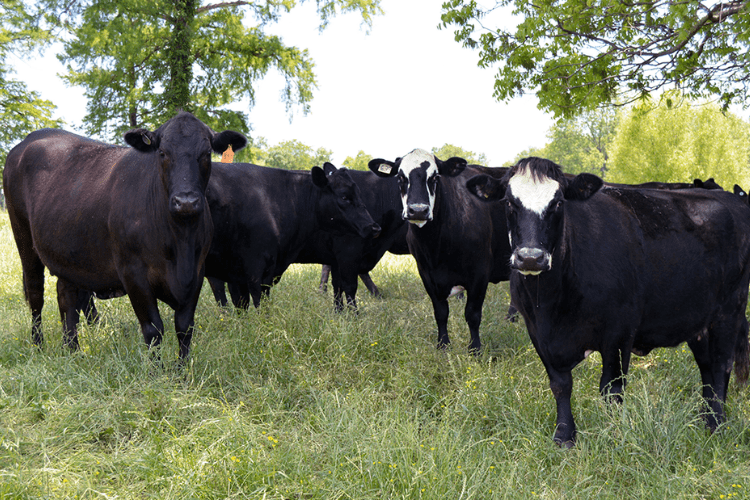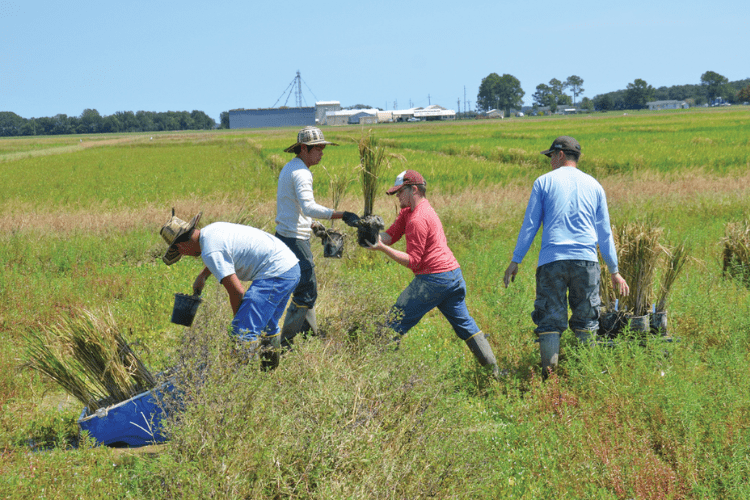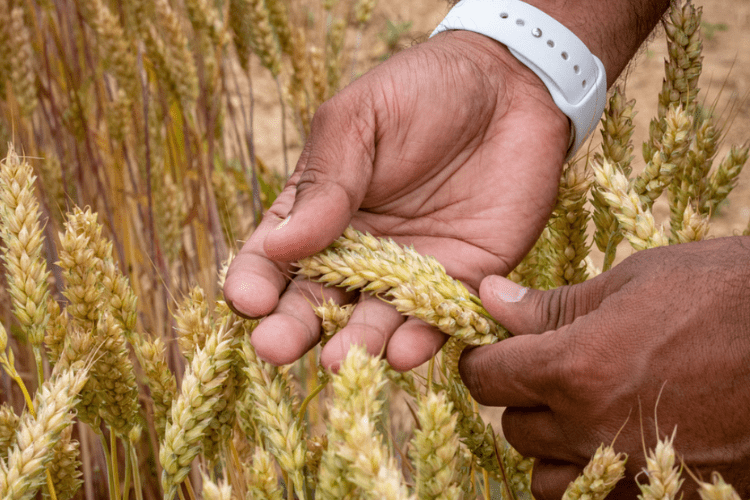MARCH 2024 TOOLKIT
LAND-GRANT UNIVERSITIES COLLABORATING TO INCREASE PRODUCERS’ PRODUCTIVITY AND PROFITS
Through research, education, and Extension, land-grant universities accelerate scientific progress, offer world-class education, and deliver practical solutions in support of our nation’s food producers.
Farmers and ranchers are confronted with rapidly evolving, complex challenges as they work to provide safe, affordable, ample, and nutritious food supply. In a broad spectrum of ways, land-grant universities help producers improve their operations, lower expenses, and boost profitability to benefit their bottom lines.
RESEARCH
Land-grant universities’ scientists are advancing cutting-edge tools and technologies that optimize farmers and ranchers’ efficiency and productivity. As examples, researchers are at the forefront of improving the health of soils to increase production and decrease the use of agrochemicals. Through precision agriculture that utilizes technologies (e.g., GPS, sensors, drones, and data analytics), researchers equip farmers and ranchers to make data-driven decisions. Scientists are breeding plants that are resistant to current and emerging pests and diseases. They are also advancing best management strategies to protect both livestock and human health.
EDUCATION
Land-grant universities’ educators spark their students’ enthusiasm and prepare them for impactful careers in agriculture. Educators provide academic instruction in a broad range of fields such as agronomy, veterinary medicine, management, and precision agriculture. They encourage experiential learning to develop their students’ skills in a fast-changing environment. Graduates with expertise and practical experience will have strong professional opportunities in sustainable food production. Educators are ensuring the success of their students who will provide tomorrow’s essential workforce as the next generation of farmers and ranchers.
EXTENSION
Based at the nation’s land-grant universities, Extension educators are trusted advisors who share research-based information and best practices directly with U.S. food producers. They advise farmers and ranchers on practical ways to increase profitability that is tailored to local conditions in all of the country’s over 3000 counties and parishes. For example, Extension educators provide diagnostic services to identify and address problems related to plant and animal diseases. Through educational workshops and hands-on training, they collaborate with producers to focus on current challenges, learn about emerging issues, optimize crop yields, and protect livestock. By also addressing producers’ mental health and financial literacy issues, Extension serves as a crucial resource for farmers and ranchers’ success in rural communities across America.
EXAMPLES FROM LANDGRANTIMPACTS.ORG
Drones, virtual fencing, gene technology moving agriculture forward
Land-grant universities use multiple technologies to solve production challenges and provide educational outreach. From using drones to assess damage following natural disasters to GPS tracking to monitor livestock within the boundaries of virtual fencing, advances in technology are helping propel food and fiber production.
Research, education improve livestock health
Livestock producers who are continually searching for the best management strategies to protect animal health, which is essential to productivity and profitability as well as the animal’s well-being. Maintaining healthy animals also protects human health.
Reaching diverse farms and farmers
Extension educators and researchers reach diverse farmers through programming, information and accessible tools. Their work ensures farming resources are available to all individuals.
Aiding farmers and rural residents with mental health struggles
Agricultural producers have one of the highest suicide rates of any industry in the nation but can be hesitant to seek help or have limited access to mental healthcare. Land-grant institutions across the country have implemented programming targeting mental health concerns.
Rapid response to animal and food safety and security threats
When disasters happen, land-grant universities are partners with local communities in sharing resources and information, providing training, offering testing and technical assistance and collaborating on future research.
Pollinators support agriculture profitability
Pollinators are essential to the environment and improve the quality and quantity of farmers’ crop yields, which adds an estimated $18 billion in crop production revenue annually. Both wild and domesticated pollinators are at risk, most notably many wild bees like bumble bees, which are in serious decline. Land-grant universities are working together to improve habitats and protect pollinators.
Improving nursery and fruit crops
Specialty crops, including fruits, floriculture and nursery crops, provide a wide range of products and play a crucial role in the American economy. Land-grant university researchers and educators provide new varieties, production practices and other innovations that help ensure a reliable supply of high-quality products for consumers.
Breeding crops tailored for the future
Food crops are constantly under attack by plant diseases and pests that result in losses in crop quantity and quality. Declines in crop health can lead to food waste and threaten global food security. Land-grant universities are breeding plants that are resistant to pests and disease for greater resilience and sustainability.
Healthy soils sustain food security
Researchers at the nation’s land-grant universities are studying the health of soils to increase agricultural production and decrease the use of agrochemicals used to grow food. Their work will contribute to our ability to meet the world’s growing demand for food.
Strong farms strengthen local food systems
New farmers just starting out and established farmers looking to expand markets have something in common: looking to the Land-grant University System to support their growth. Strong local farms strengthen local food systems and food security.
SOCIAL MEDIA
SAMPLE POSTS
RESEARCH
#LandGrantUniversities drive agricultural innovation. Here’s how @SCHOOL is helping the nation’s [crop/livestock] producers through [cutting edge research/precision ag]: PROJECT
EDUCATION
Through hands-on, experiential learning, #LandGrantUniversities bridge the gap between theory and practice in agriculture education. @SCHOOL students gain the skills and knowledge needed to solve the world’s evolving challenges in sustainable food production.
EXTENSION
.@SCHOOL Extension educators work in partnership with STATE ranchers and farmers, empowering producers with practical solutions rooted in research: PROJECT
Looking for pre-made stories to feature? Check out:
- Land-grant Impacts
Scroll down to "View by Institution" and click your university's name. Only institutions who submitted impacts to the National Impacts Database in 2023 are listed. This page features research and Extension impacts. - Multistate Research Funds Impacts
Scroll down to "Filter by Institution" on the sidebar and click your university's name. This page features research impacts.
Feel free to reach out to us with specific posts that you would like @AgIsAmerica to share. Please email your request to Kim Scotto at agcomms@aplu.org or use #AgIsAmerica.
HASHTAGS AND HANDLES
HASHTAGS
#LandGrantUniversities
#AgIsAmerica
HANDLES
|
Ag is America |
@AgIsAmerica |
|
APLU Ag |
@APLU_Ag |
|
Sec. Vilsack (Secretary of Agriculture) |
@SecVilsack |
|
USDA |
@USDA |
|
USDA National Institute of Food & Ag |
@USDA_NIFA |
|
APLU |
@APLU_News |
|
Cooperative Extension |
@Ext100Years |
CALENDAR
MARCH HOLIDAYS
MONTHS
National Celery Month, #CeleryMonth
National Frozen Food Month, #NationalFrozenFoodMonth
National Nutrition Month, #NationalNutritionMonth
National Peanut Month, #PeanutMonth
National Women’s History Month, #WomensHistoryMonth
WEEKS
March 4-8: National School Breakfast Week, #NSBW24, @SchoolLunch
March 10-16: Groundwater Awareness Week, #GWAW, @ngwatweets
March 17-23: National Agriculture Week, #AgWeek, @agday
DAYS
March 1: National Pig Day, #NationalPigDay
March 2: Anniversary of Hatch Act of 1887 (Establishment of Experiment Stations)
March 3: World Wildlife Day, #WWD2024, #ConnectingPeopleAndPlanet
March 6: National Frozen Food Day, #NationalFrozenFoodDay
March 8: International Women's Day, #IWD2024, #InspireInclusion
March 14: National Pi Day, #PiDay
March 19: First Day of Spring, #SpringBegins
March 19: National Ag Day, #AgDay24 @agday
March 19: National Poultry Day, #NationalPoultryDay
March 21: International Day of Forests, #ForestDay
March 22: World Water Day, #WorldWaterDay
March 26: National Spinach Day, #NationalSpinachDay
Source: March - National Day Calendar



